Transition Points Podcast
A five-part series about the experiences of some of our Science Minors and Achievers alumni.
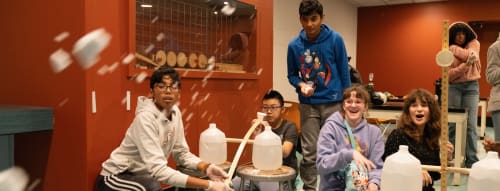
Developing YOUth! was a project studying the impact of the Museum’s Science Minors and Science Achievers youth development programs on participants after they graduate from high school and move on into the world. More specifically, it will look at their career choices and relationships with science. The Science Minors and Achievers programs were made up of a diverse group of adolescents, many of whom belong to groups historically underrepresented in STEM careers but who together have the power to change the future of our country, the world and science as a whole. This project will help identify ways Griffin MSI, and other organizations like it, can support youth as they build their own paths. Science Minors and Achievers is now RISE Teen Program.
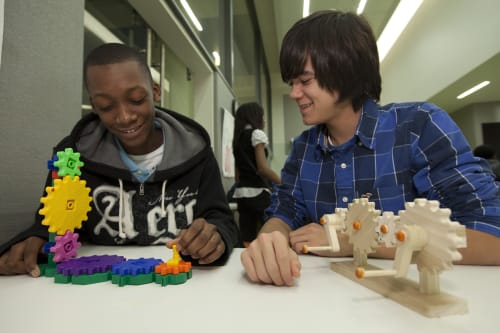
"What I’ve learned here is going to help me in college […] I am definitely going to look back on it as a very meaningful experience. One of the most meaningful experiences I have ever had."
Ana, former participant
"Science Achievers made me from a guy who was just good at science to a guy who was — to a guy who had a much greater passion for it."
Andy former participant
"I feel very capable in my science courses…the Museum gave me a lot of confidence."
Karani former participant
"[C]oming to the museum definitely opened up my love of science and math more than I thought it would. And the museum kind of just helped me become comfortable with the fact that I’m a science and math person, and I enjoy it."
Lena former participant
"That program started my love of science."
Tammy former participant
1/5
The project followed three cohorts of adolescent youth for at least five years. Key aspects of the project's design helped us understand how out-of-school time programs can impact participation rates of groups that have been historically underrepresented in STEM fields.
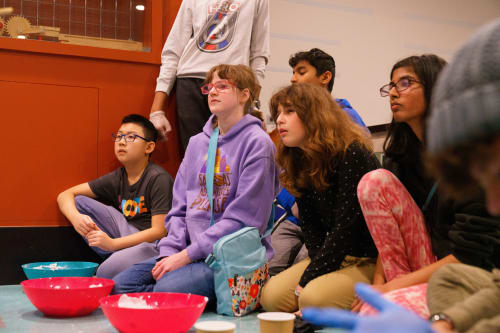
The study is designed as a five-year longitudinal study that begins when a program participant is no longer in high school. Each year, we collect data using quantitative measures such as surveys and school performance as well as qualitative measures such as semi-structured interviews and deep immersion ethnographic research. The goal is to follow the participant through their post-secondary experiences and into their first career decisions. Our data represent real people in real life. As such, our measures need to be culturally responsive and account for a variety of backgrounds, learning and communication styles. We strive for our instruments and frameworks to be culturally validated and sensitive to our specific study populations. Professional and community advisory boards help to identify sources of bias and maintain the study’s validity and relevance.
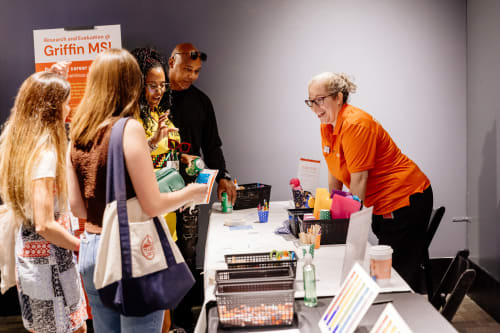
Together, these two frameworks have helped inform the design of our project and will be used as lenses to analyze data and interpret results.
Agency is important for youth development, particularly for young girls and young girls of color who frequently work to make sense of their identity (Brickhouse & Potter, 2001). This process can work in two ways: (1) identity can influence both how girls view themselves and their relationship to science (see Calabrese Barton, et al., 2013), and; (2) also how they view science itself. One of the key advantages of the Science Minors and Achievers programs is how it empowers youth participants. For example, young people have the opportunity to produce a live television show that focuses on science content and is broadcast on a Chicago public access channel. Such activities draw on young people’s strengths and unique backgrounds (Calabrese Barton & Tan, 2010) and, as a result, can create a new connection to science (Gonsalves, et al., 2011; Tan, Calabrese Barton & Rivet, 2007).
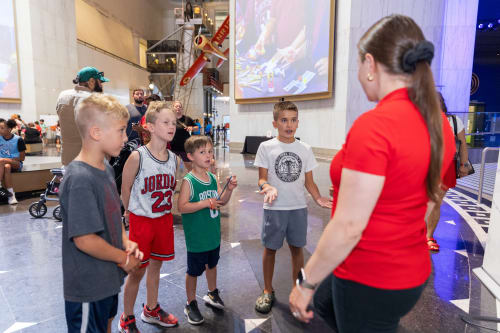
Below is a selected list of recent publications and presentations. We are currently developing manuscripts for youth development and anthropology journals and are open for inquiries about collaboration and partnerships! For more information, email us at: [email protected].
Falk, J. H, Koke, J., Price, C. A. & Pattison, S. (2018). Beaverton, Oregon: Institute for Learning Innovation.
View PDFPrice, C. A. & Kares, F. R. (2016). San Antonio, TX.
Habig, B., Gupta, P., Adams, J., Price, C. A., Segovia, G., et al. (2016). Paper proposal submitted to and accepted by the 2017 Annual International Conference of the National Association for Research in Science Teaching (NARST), San Antonio, TX.
Price, C.A. & Kares, F. R. (2016, July/August). Dimensions, 38-42.
Price, C. A. & Kares, F. R. (2016)Poster presented at the 2016 International Conference of the Learning Sciences, National Institute of Education, Singapore.
View PDFPrice, C. A., Kares, F. R., & Segovia, G. (2016). Paper presented at the Annual Meeting of the Jean Piaget Society, Chicago, IL.
Price, C. A. & Kares, F. R. (2016). Paper presented at the 2016 Do Good Data Conference, Chicago, IL.
Dr. Price is the Director of the Research and Evaluation Department at the Griffin Museum of Science and Industry and Principal Investigator (PI) of the study. He is trained in the learning sciences and mixed methods research. After a decade in the field of astronomy, he obtained his Ph.D. in Science Education from Tufts University in 2011. He has been the PI of six awards from the National Science Foundation. In his spare time, he enjoys playing with his daughter, running and visiting art museums.
Dr. Tai is an Associate Professor of Education at the University of Virginia. His research focus includes the study of out-of-school time science experiences and science interest and engagement. His work includes 58 data-based peer-reviewed research journal articles including two appearing in the journal Science. A self-professed science geek, he likes collecting interesting sciency things to use in his classes. His most interesting recent acquisitions are a 5-7/8 inch megalodon tooth from North Carolina and a 1-pound fragment of the Campo del Cielo meteorite from Argentina.
Dr. Ngyuen joined the project in March, 2021. She has a Bachelor of Arts in Comparative Sociology, a Graduate Certificate in Women & Gender Studies, and a Master of Science and a Doctorate in Sociology. She studies race, ethnicity, gender, class, and citizenship through a sociological lens. Her research interests center on identity and identity-making along with practical uses of research.
Mr. Wunar was an original Co-PI of the project as the Director of Community Initiatives at the Museum of Science Industry, Chicago. He led the Museum’s strategic efforts to engage youth, families and communities in science learning experiences. He is now president and chief executive officer of Discovery World in Milwaukee, but still serves the project as an advisor.
Ms. Skeeles-Worley recently obtained her Ph.D. in science education from the University of Virginia where she studied under Robert Tai. She comes from a background in field biology and public school education as a high-school biology and ecology teacher. In her spare time, she enjoys spending time with her husband and two daughters, running, hiking, camping and live music.
Dr. Kares is the Postdoctoral Researcher Emeritus of the study. She has a Ph.D. in Cultural Anthropology from Northwestern University. She is committed to and has extensive experience in community-based and participatory action research projects. Her previous work in public policy and non-profit research focused on adolescent development and identity, juvenile justice and youth civic engagement. When she’s not doing research, she enjoys baking, yoga and spending time with loved ones and her Boston terrier puppy.
Dr. Mroczkowski recently earned her Ph.D. in Community Psychology from DePaul University, where she studied the educational experiences of Latina/o youth and mentoring. For her dissertation research, Dr. Mroczkowski conducted an in-depth qualitative study of the effects of a science support program on low-income Latina/o youth. She is excited to learn more about the science minors and achievers’ experiences, perspectives, and plans for the future. When she is not doing research, Dr. Mroczkowski can be found chasing after her 10-month-old son and French bulldog, who love to get into all sorts of trouble together. Her other interests include cooking, sewing, and physical fitness.
The following members serve as an advisory board, providing feedback and expertise on all facets of the project.
Dr. Loyd is Assistant Professor of Educational Psychology. Her research examines how individual (ethnic-racial identity, coping) and contextual-level factors (racial discrimination) affect African-American and Latino youths’ development.
Dr. Barton is currently Co-Editor of the Journal of Research in Science Teaching and has extensive research experience on issues of equity and social justice in science education, with a particular emphasis on the urban context. Drawing from qualitative and critical/feminist methodologies, she has extensive experience conducting ethnographic and case study research in urban community settings.
Dr. Krishnamurthi is Vice President for STEM Policy at the Afterschool Alliance, where she works to advance federal and state policies, research and strategic partnerships to support high-quality STEM programming in after-school programs. One of her current projects is leading the Afterschool STEM Hub, which serves as a think tank of key leaders in the field providing strategic vision and direction for advocacy, communications and research-based policy recommendations.
Dr. Lee is a Senior Research Scientist whose main areas include developing valid and reliable assessment instruments in science education, technology-enhanced curriculum design and research, and data analytics and automated feedback in online learning environments. She is currently a co-PI on four NSF science education research projects.
Dr. Ou Lydia Liu is Senior Director of Research in Higher Education at the Educational Testing Service and assumes overall responsibility for research in higher education at ETS. Dr. Liu has conducted extensive research in student learning outcomes assessment. She is also a PI or co-PI on four NSF-funded grants on innovative science assessment and automated scoring.
Dr. McCreedy is Vice President of Audience and Community Engagement at the Discovery Center at Murfree Spring in Murfreesboro, Tenn. In her almost 30 years in the field, she has forged national and regional collaborations focused on cultivating girls and women’s science exploration, building facilitator capacity in science teaching, and promoting family and parent engagement in children's science learning.
Dr. Glass is the Director of Professional Development for the Association of Science-Technology Centers. She leads projects and programs that design training, learning experiences and professional support for informal science learning practitioners. Her work focuses on connecting science centers and museums to other education stakeholders, building strategic alliances that benefit the field of informal science learning and the public.
A five-part series about the experiences of some of our Science Minors and Achievers alumni.
The Developing YOUth! team shared reports and updates during the program's duration.
© 2026 Kenneth C. Griffin Museum of Science and Industry